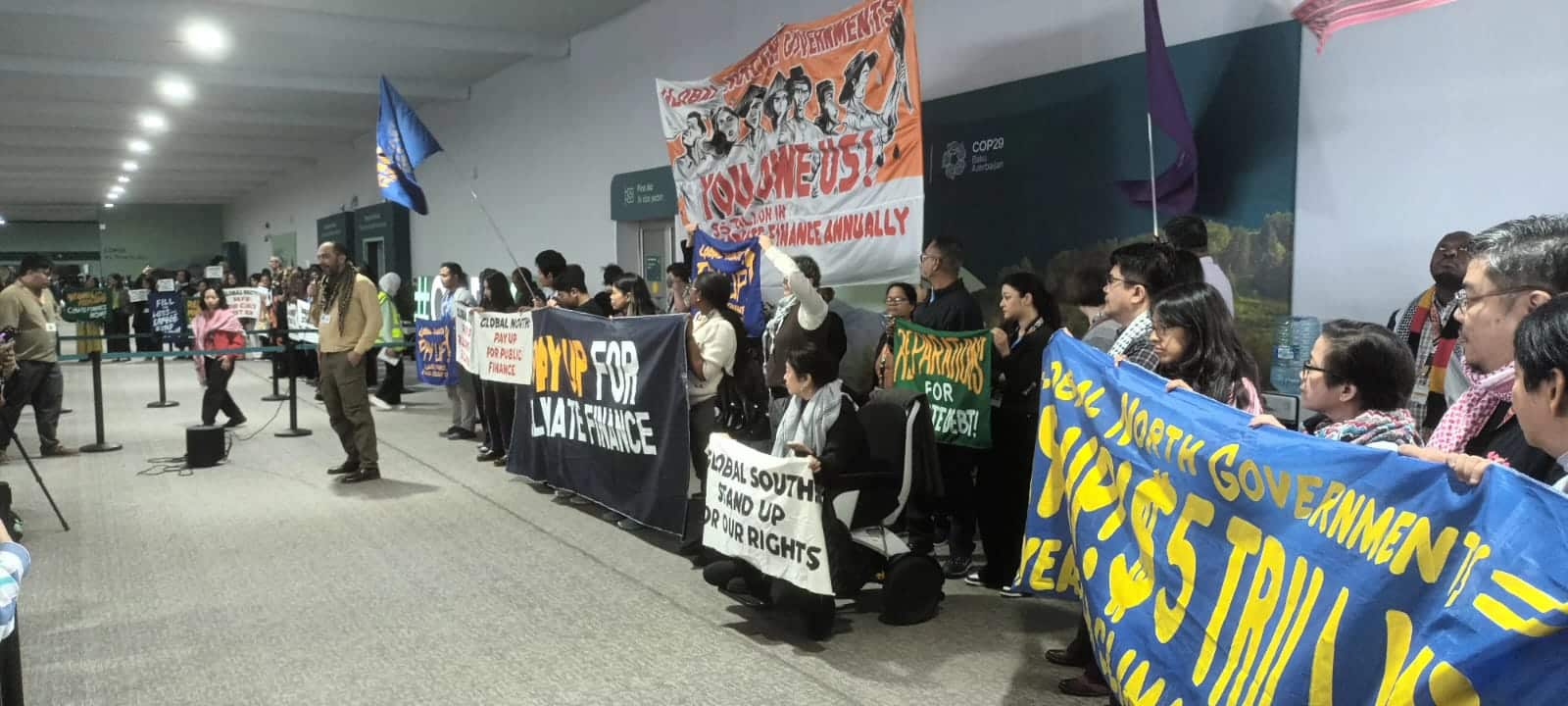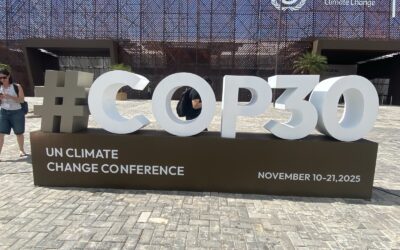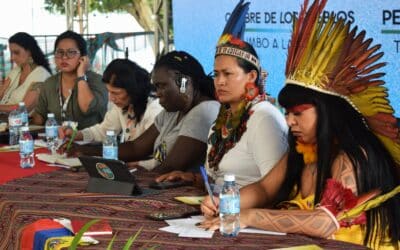Rejecting the “carbon violence” done to communities through forest offsets and financing that leads to “climate debt,” communities plan to champion real solutions on climate at COP30.
Baku, 21 November 2024–In a press conference on Wednesday, nearing the end of the 29th UN Climate Summit (COP29) in Baku, Azerbaijan, Global Forest Coalition representatives offered a stark assessment of the lack of progress on tackling the drivers of climate change, suggesting that hope for the future lies in the social movements and communities that are offering real solutions to the problem, rather than market-based false solutions pushed by governments and corporate actors in the talks.
“It’s 32 years since the Rio Declaration, and we’re at the 29th COP. We’re also on the verge of a tipping point,” said Souparna Lahiri, senior climate and biodiversity advisor at GFC. “But are we responding appropriately? Are we not still delaying, distracting, and in denial that the climate crisis is worsening? The UNFCCC is failing… our governments are failing the people.”
Lahiri continued:
Our demands and concerns are increasingly being ignored in this space. Communities, in addition to bearing the brunt of the climate crisis, are facing increasing oppression on the ground. Any reference to Indigenous Peoples, small farmers, women, or youth is deleted in the negotiating rooms. Any reference to real actions is blocked in the negotiating rooms.
Outside the negotiating rooms, civil society groups and leaders are coming together to “carve out our own spaces,” the GFC spokespersons suggested. One example is the Baku Forest Declaration released on 19 November and signed by over 30 organizations around Central Asia and the world.
GFC’s regional coordinator for Central Asia, said the Baku Forest Declaration “urges a paradigm shift in climate negotiations to prioritize forest protection, Indigenous rights, and climate justice.”
“We call on negotiators and governments to recognize that the time to act is now; if we fail to protect our forests, we fail the planet and future generations,” he said. He suggested that civil society groups would issue another joint declaration on rights-based forest protection, specifically in the Amazon region, during next year’s Climate Conference in Belem, Brazil.
Linda Gonzalez from Censat Agua Viva in Colombia and a member of GFC agreed that the most exciting and effective work on addressing the climate crisis is coming from the grassroots.
The COPs haven’t brought about big policy changes, but have led to connections among social movements, which are key for advancing environmental, social, economic, and gender justice. We need conditions for real participation, and countries and negotiators must listen actively to them. The solution cannot come from those who caused the climate and environmental crises, nor from carbon markets or biodiversity markets, which benefit financial institutions and companies. It demands the recognition of a historical and ecological debt that requires urgent reparation.
The Global Forest Coalition, a network of over 130 groups worldwide, has consistently pointed out the failures of programs like REDD+, which has become a favored false solution to climate change among corporate actors at the UN talks, much like geoengineering or bioenergy from monoculture tree plantations.
False solutions, GFC says, often consider—and commercialize—elements of nature in isolation. Nnimmo Bassey of Nigeria, the director of Health of Mother Earth Foundation, spoke of the “carbon violence” done to communities when forests and other elements of ecosystems are taken advantage of as mere “carbon sinks.”
Bassey stressed the need to “ensure that the voices of victims of carbon violence across the world are heard.
Carbon violence is being perpetuated at every oil well across the global south especially; it is being perpetuated in carbon credit-designated forests. All this is bringing violence to communities who depend on forests. And we can’t go to the Amazon and begin to amplify the same problems.
To move forward with meaningful action on climate change, Maureen Santos of FASE Brazil emphasized the need to reexamine perhaps deliberately vague concepts such as ‘climate finance,’ ‘climate action,’ and ‘environmental integrity’ and be more specific about what type of finance and what type of action is needed.
“We want climate justice finance, we don’t want climate debt,” Santos said. She slammed the double accounting of forest and biodiversity offsets and fortress-style conservation efforts, emphasizing that “Forests have people inside [them], it’s not only far-away biodiversity.”
Santos highlighted preparations for the People’s Summit alongside COP30 in Belem, saying “the idea is to create a common agenda for next year so that we can stay in this process, not only in Latin America and Amazonia but all over the world” with simultaneous mobilizations to “channel our proposals to these spaces that need to make the change.
##ENDS




